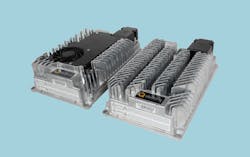This video is part of the TechXchange: EV Battery Management and TechXchange Talks.
As the auto industry enters the electric-vehicle (EV) age, high-voltage battery packs are becoming standard to help boost range and reduce charging times. Consequently, the power electronics inside the car need to evolve—or be replaced.
The shift has major implications when it comes to safely charging the battery packs in the EV. Thus, it also has implications for companies such as Delta-Q Technologies that design onboard and offboard charging solutions.
We recently talked with Mourad Chergui, senior product manager at Delta-Q, to learn more about how it’s navigating the challenges and review what’s inside its latest chargers: the ICL1500 and XV3300.
The ICL1500 is a modular and scalable charger. It’s integrated with Delta-Q’s stackable charging software, which enables you to link up to six chargers together to create charging solutions that deliver up to 7.5 kW.
The stackable design of the 1.5-kW charger offers the flexibility to use the solution as an on-board charger, off-board charger, or a combination of the two. It is available in 85- and 120-V models: The 85-V models can optimally charge Li-ion batteries from 14 to 24 cells in series, and the 120-V models recharge systems from 21 to 34 cells in series—both models work with various Li-ion chemistries.
The XV3300 is built for automotive and heavy-duty construction vehicles that require higher power levels. Its three-in-one design unites a 3.3-kW charger, 500-W dc-dc converter, and EV charging-station interface compliant with SAE J1772 (level 1 and 2) and IEC 61851 (mode 2 and 3) to save space under the hood. This feature allows it to charge from standard ac charging stations for EVs across North America and Europe.
The XV3300 also comes equipped with Delta-Q’s stackable charging software, enabling EV manufacturers to parallel the charger to deliver up to 22 kW to meet their higher power and faster charging needs.
For reliability and safety, the 3.3-kW charging system, due out in 2023, has built-in short-circuit, overvoltage, and overtemperature protection.

